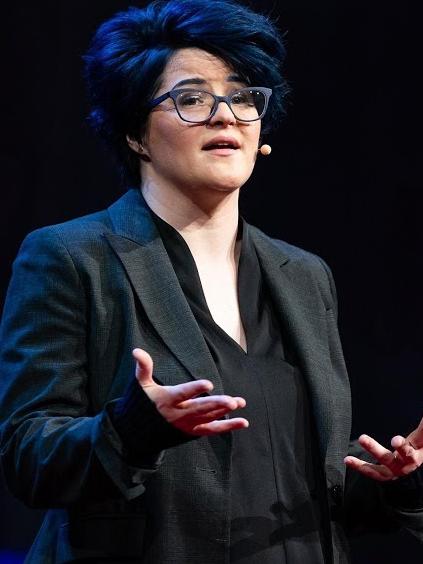Expert share their tips on how to re-sync your flailing sex lives
Ready to rock but frustrated that all your partner wants to do is roll over and go to sleep? You’re not alone – 50 per cent of Australians would like their partner to initiate sex more often. Here’s how to get your sex drives back in sync.
Sex
Don't miss out on the headlines from Sex. Followed categories will be added to My News.
- Let’s talk about sex: Aussies reveal bedroom secrets
- What eggplants and tacos really say about your sex life
In the early days of a relationship, you’re usually too busy wondering how and where to get naked as often as possible to worry about your libido.
But as a relationship settles into a less-frenzied rhythm, sex drives can fluctuate — or sometimes drop off altogether.
As long as you’re both happy with how often you’re having sex, it doesn’t matter whether you’re swinging from the chandeliers every night, once a fortnight or once a month.
But what if one of you suddenly loses interest in sex, giving the other sleepless nights for all the wrong reasons?
“Mismatched libidos is the number-one issue couples come to me with,” sex and relationships expert Dr Ian Kerner said.

“It really is an issue that strikes men and women equally.”
In fact, low libido can be caused by a huge range of issues.
“There are a variety of factors that may contribute, each of which can impact people differently,” Dr Amanda Newman, from Jean Hailes for Women’s Health, said.
MORE FROM BODY+SOUL
Wild new sex act you shouldn’t google
How alcohol impacts your during sex
People who use emojis have more sex
“Oestrogen and testosterone levels can affect both men and women. The hormone fluctuations that come from being postmenopausal or using the pill, for example, can affect some women’s libidos.
“If you feel unwell, you’re unlikely to feel like having sex, and environmental factors such as having teenagers in the house who could walk in on you at any time can contribute to a low libido, too,” she said.
HAVE YOUR SAY: Do you agree with our survey results? Want to share your thoughts on sex? Take part in our survey online at bodyandsoulmates.com.au
But while there’s not much you can do about the flu or a house full of children, if the changes in your levels of desire are triggered by emotional factors, those can, and should be, addressed.
WHAT’S NORMAL, ANYWAY?
“When it comes to desire, there’s genuinely no such thing as ‘normal’,” sex educator Dr Emily Nagoski said.
It’s normal and healthy for sexual desire to change in response to changing contexts.
“During the hot-and-heavy falling-in-love stage of a relationship, emotion keeps that fire burning hot. When people are stressed, desire often falls to the bottom of their to-do list.”
Although both men and women can experience fluctuating libidos, women’s desire is more sensitive to context than men’s.
While male arousal is closely tied to visual cues, female arousal requires a combination of several physical and emotional triggers to achieve the same effect.
The factors that trigger female desire can be so complex, research has shown women can become physically aroused without even being consciously aware of it.
So if you’re a woman and your libido is lower than your male partner’s, working on ramping up desire could take a bit more time and effort.


“The mechanism in your brain that controls sexual response has two parts — a sexual accelerator that notices all the sex-related stimuli in the environment and sends a ‘turn-on’ signal; and a sexual brake that notices all the reasons not to be turned on right now and sends a ‘turn-off’ signal,” Dr Nagoski said.
“When we struggle with arousal, desire, orgasm or sexual pleasure, sometimes it’s because there’s not enough stimulation on the accelerator, but more often, it’s because there’s too much stimulation on the brake. Common factors that can hit the brakes include stress and exhaustion, body image, a history of trauma or relationship difficulties.”
In other words, if your relationship or environment contains too many turn-offs, they can cancel out the turn-ons, no matter how desirable you find your partner.
WHAT TO DO ABOUT IT
“When one person wants sex more than the other, both may struggle with feelings of inadequacy and frustration. Over time, frustration can build and one or both may resent or blame the other,” Dr Kerner said.
So, how do you stop your relationship from stalling?
Dr Nagoski said the first step is to identify what’s turning on the brakes for the partner who is “off” sex.
If the reason is physical — such as pain during sex or trouble getting an erection — then a trip to your GP is a must. If the issue is psychological or emotional, however, it’s time to get talking.
“If you’re experiencing any level of distress or angst about your sex life, the first thing to do is talk to your partner and try to identify the reasons for your or their low libido,” Dr Kerner said.
“If you can’t communicate, or feel like you can’t get through it alone, then it’s time to consider seeing a sex therapist.”

Depending on the reasons for the mismatch, there may be several routes you can take to resolve your issue.
“It could be that you need to make sex more of a priority by changing your schedule, arranging regular date nights or eliminating any stressors in your life,” Dr Kerner said.
Dr Nagoski said that for some, feeling self-conscious about your body could be preventing you from being emotionally present for sex, so you may need to work on your body image.
You may also discover that one of you is a “spontaneous desire” kind of lover, while the other is a ‘responsive desire’ kind of person, she says, in which case, you can work on finding a middle ground when it comes to getting each other in the mood.
Dr Newman also recommends prioritising “decision-driven sex”.
“If you wait for an overwhelming desire for sex, you may be waiting for a very long time,” she said.
“It’s better to make a decision to have sex with your partner because it’s a nice thing to do, and let arousal follow after.”
A therapist may be able to help by giving you some techniques to bring back the balance, like holding off on sex altogether for a while to reconnect emotionally, for example.
Search societyaustraliansexologists.org.au for an accredited therapist near you.
So get talking and you and your partner could be back swinging from the chandeliers in no time.
HAVE YOUR SAY: Do you agree with our survey results? Want to share your thoughts on sex? Take part in our survey online at bodyandsoulmates.com.au
